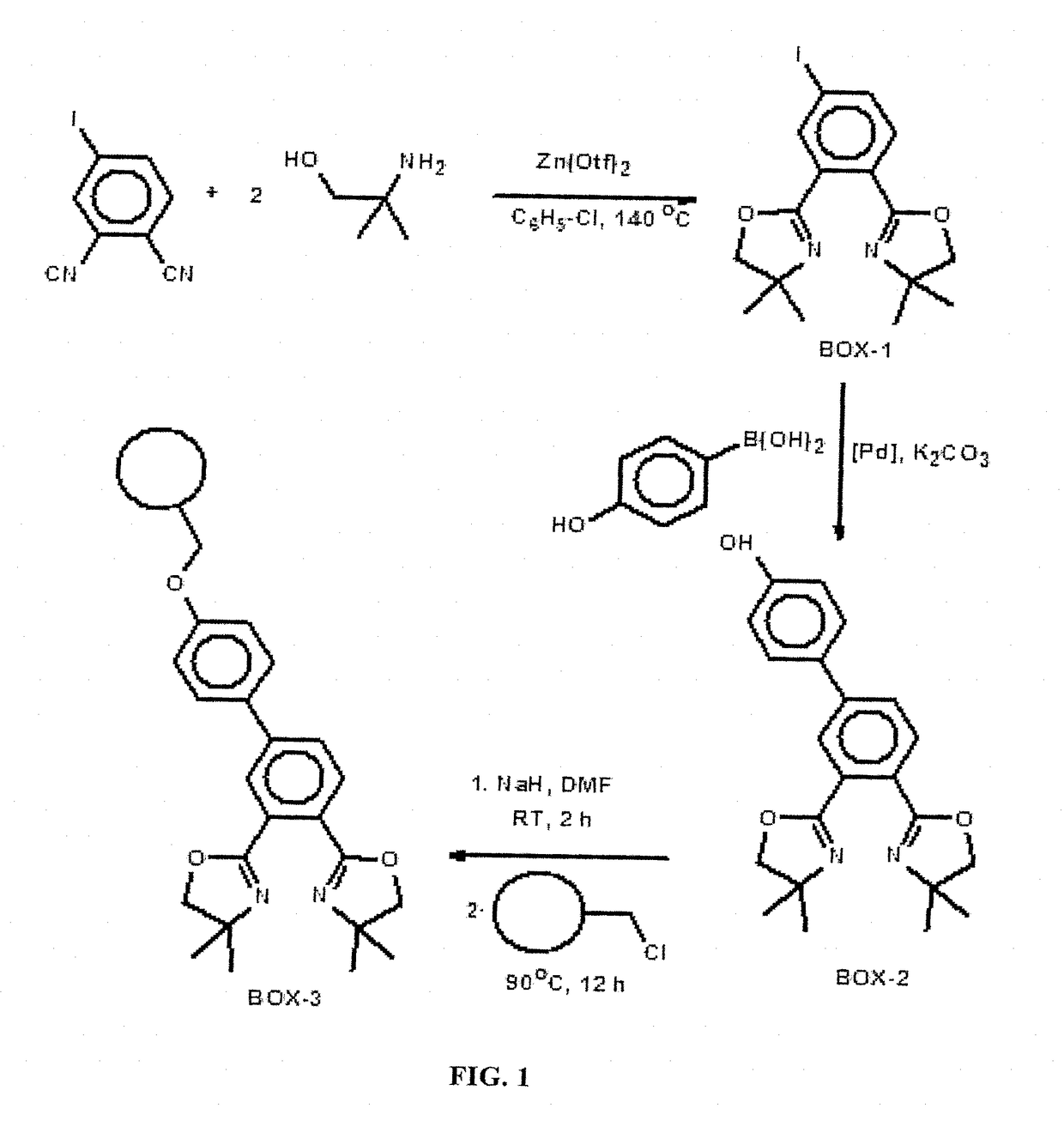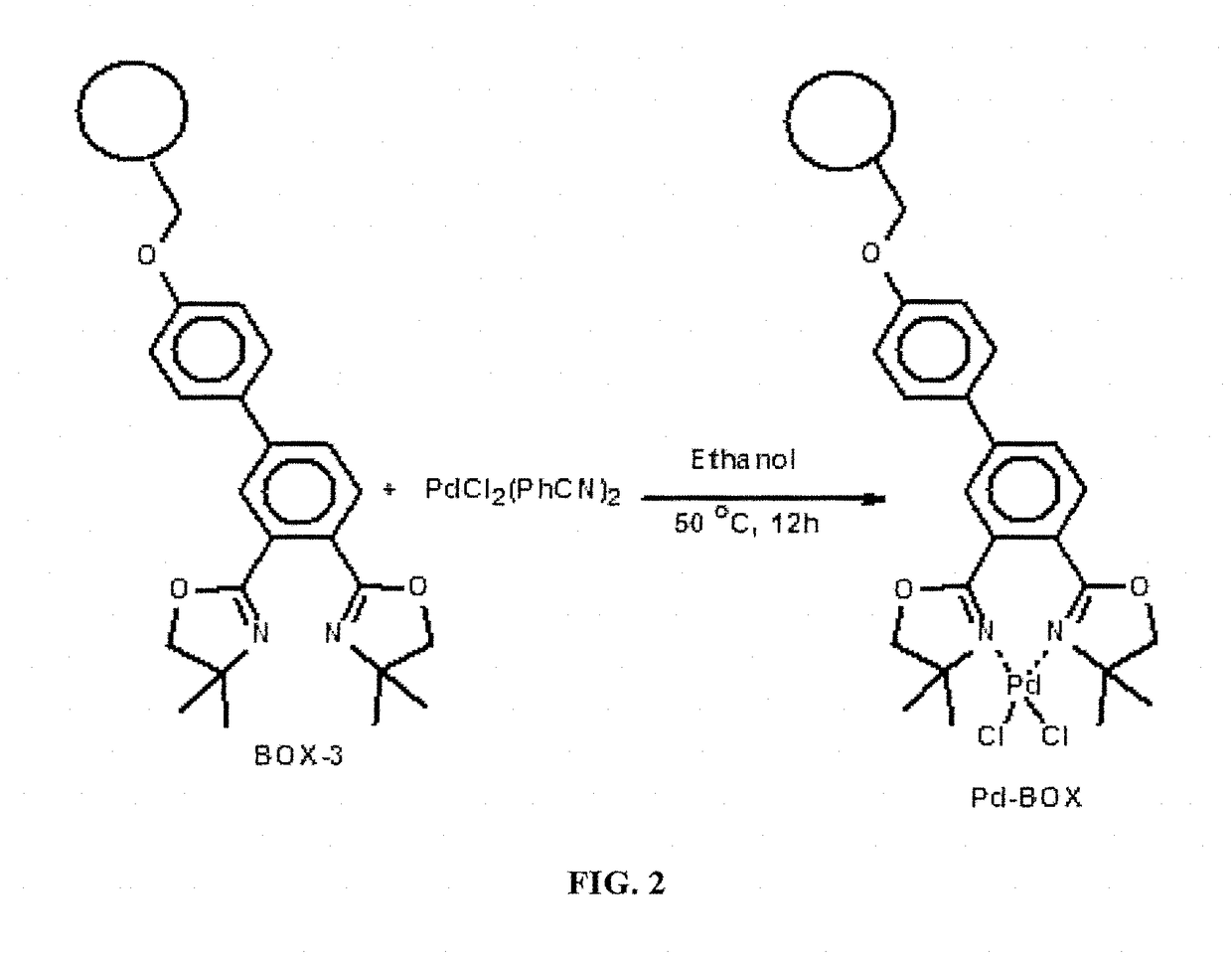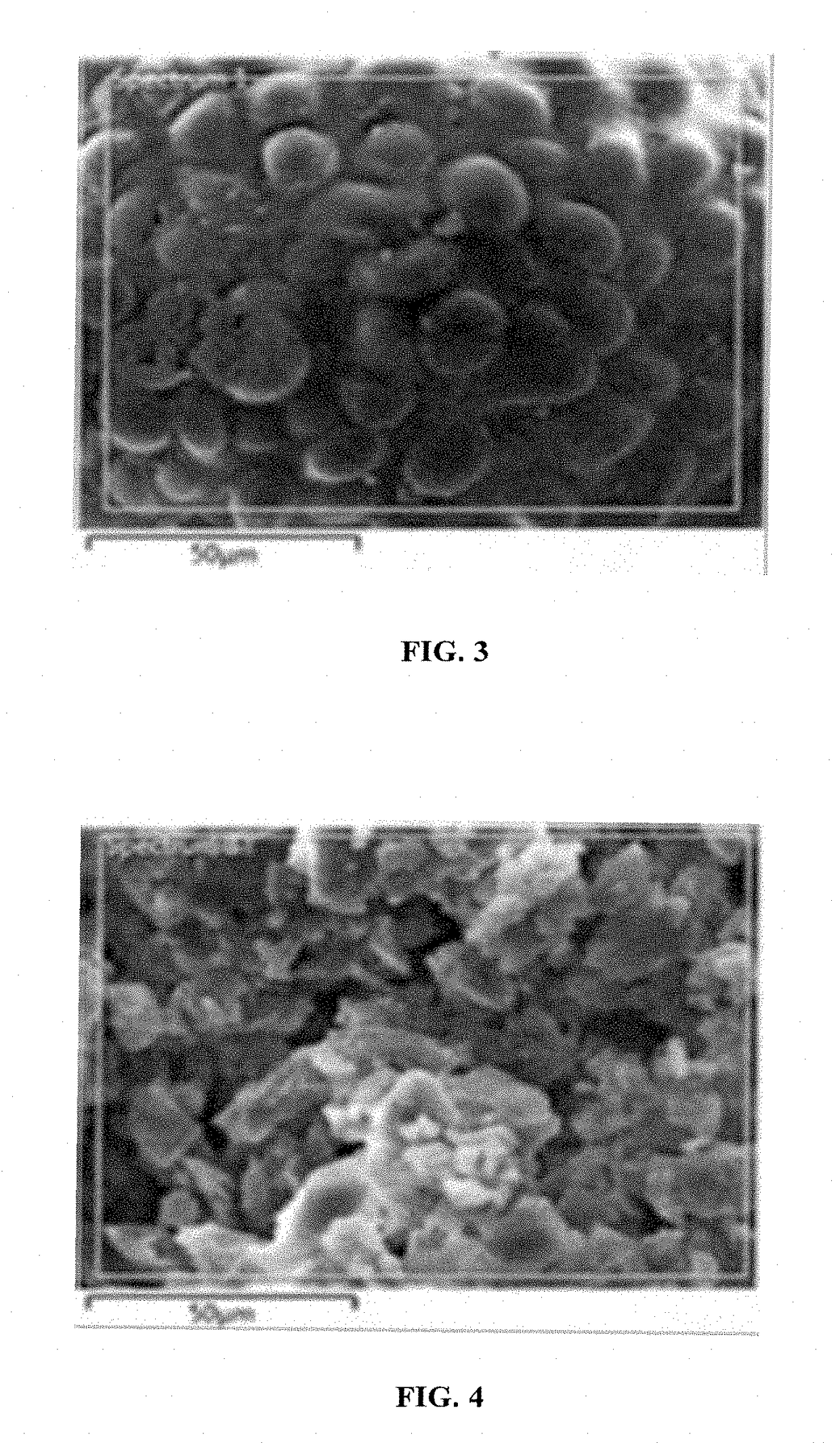Solid-supported palladium (II) complex as a heterogeneous catalyst for cross coupling reactions and methods thereof
a catalyst and complex technology, applied in the direction of organic compound preparation, organic compound preparation, coordination complex catalyst, etc., can solve the problems of reducing the chance of industrial implementation, complex coupling process, and inability to fully support the catalyst ligand and complex catalyst of solid-supported palladium bis(oxazoline) complex,
- Summary
- Abstract
- Description
- Claims
- Application Information
AI Technical Summary
Benefits of technology
Problems solved by technology
Method used
Image
Examples
example 1
Synthesis of bis(oxazoline) ligand 2,2′-(4-Iodobenzene-1,2-diyl)bis(4,4-dimethyl-4,5-dihydro-1,3-oxazole) (BOX-1)
[0124]The iodo functionalized ligand (BOX-1) was prepared. FIG. 1 shows the scheme for this preparation starting from the reaction of 4-iodophthalonitrile with 2 mol equivalents of 2-amino-2-methyl-1-propanol. The BOX ligand was prepared in accordance with an earlier published procedure by the inventors for similar homogeneous catalysts [M. B. Ibrahim, B. El Ali, M. Fettouhi, L. Ouahab, Appl. Organometal. Chem, 2015, 29, 400; and M. B. Ibrahim, S. M. Shakil Hussain, A. Fazal, M. Fettouhi, B. El Ali, J. Coord. Chem. 2015, 68:3, 432; and S. M. Shakil-Hussein, M. B. Ibrahim, A. Fazal, R. Suleiman, M. Fettouhi and B. El Ali, Polyhedron, 2014, 70, 39.—each incorporated herein by reference in its entirety]. A solution of 4-iodophthalonitrile (4.0 mmol) and zinc triflate (5.0 mol %, 0.2 mmol) in dried chlorobenzene (30 mL) was stirred at room temperature for 15 minutes. A soluti...
example 2
Synthesis of hydroxyl functionalized bis(oxazoline) ligand 3,4′-Bis(4,4-dimethyl-4,5-dihydro-1,3-oxazole-2-yl)biphenyl-4-ol (BOX-2)
[0126]The hydroxyl functionalized ligand (BOX-2) was prepared from the Suzuki-Miyaura cross coupling reaction of BOX-1 with 4-hydroxyphenyl boronic acid (FIG. 1). 2,2′-(4-Iodobenzene-1,2-diyl)bis(4,4-dimethyl-4,5-dihydro-1,3-oxazole) (BOX-1) (0.50 mmol), PdCl2 (0.025 mmol, 5.0 mol %), K2CO3 (1.0 mmol, 2.0 mol equivalent), DMF (2 mL), distilled water (2 mL) and 4-hydroxy phenylboronic acid (0.6 mmol), were added together in a 10 mL round bottom flask. The mixture was stirred at 70° C. for 6 hours. After completion of the reaction, the mixture was cooled down and acidified with IM HCl. The acidified solution was extracted 3 times with Et-OAc and the combined Et-OAc extracts were dried using anhydrous MgSO4. The solvent was removed under reduced pressure and the product was purified by silica gel column chromatography using hexane-EtOAc (1:9) as an eluent.
[...
example 3
Synthesis of Supported Bis(Oxazoline) Ligand on Merrifield Resin (BOX-3) and Palladium (II) Bis(Oxazoline) Supported on Merrifield Resin (Pd-BOX)
[0128]The functionalization of Merrifield resin with the bis(oxazoline) ligand (BOX-2) to form Merrifield resin supported BOX ligand (BOX-3) (FIG. 1) followed by subsequent complexation with palladium chloride to form the polymer supported palladium bis(oxazoline) catalyst (Pd-BOX). FIG. 2 shows the shows the scheme for this preparation. NaH (0.5 mmol) was added in one portion to a stirred solution of 3,4′-Bis(4,4-dimethyl-4,5-dihydro-1,3-oxazole-2-yl)biphenyl-4-ol (BOX-2) (0.30 mmol) in dry DMF in a dry flask. The mixture was stirred for 2 hours at room temperature and under an argon atmosphere. Merrifield resin (0.30 mmol) was added and the mixture was stirred at 90° C. for 12 hours. The solid product was filtered and washed successively with methanol, water, acetone, and dichloromethane. The product was dried at room temperature under va...
PUM
| Property | Measurement | Unit |
|---|---|---|
| Fraction | aaaaa | aaaaa |
| Diameter | aaaaa | aaaaa |
| Fraction | aaaaa | aaaaa |
Abstract
Description
Claims
Application Information
 Login to View More
Login to View More - R&D
- Intellectual Property
- Life Sciences
- Materials
- Tech Scout
- Unparalleled Data Quality
- Higher Quality Content
- 60% Fewer Hallucinations
Browse by: Latest US Patents, China's latest patents, Technical Efficacy Thesaurus, Application Domain, Technology Topic, Popular Technical Reports.
© 2025 PatSnap. All rights reserved.Legal|Privacy policy|Modern Slavery Act Transparency Statement|Sitemap|About US| Contact US: help@patsnap.com



